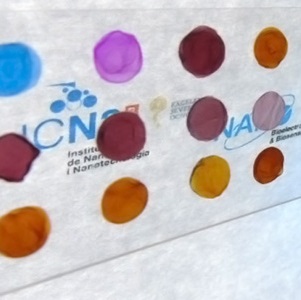Jul 23 2015
An international team led by the ICREA Prof Arben Merkoçi has just developed new sensing platforms based on bacterial cellulose nanopaper. These novel platforms are simple, low cost and easy to produce and present outstanding properties that make them ideal for optical (bio)sensing applications. The results have been reported in ACS Nano.

ICN2 researchers are going a step further in the development of simple, low cost and easy to produce biosensors. In an article published in ACS Nano they recently reported various innovative nanopaper-based optical sensing platforms. To achieve this endeavour the corresponding author ICREA Prof Arben Merkoçi, Group Leader at ICN2 and the first author, Dr Eden Morales-Narváez (from ICN2) and Hamed Golmohammadi (visiting researcher at ICN2), established an international collaboration with the Shahid Chamran University (Iran), the Gorgan University of Agricultural Sciences and Natural Resources (Iran) and the Academy of Sciences of the Czech Republic.
Cellulose is simple, naturally abundant and low cost. However, cellulose fibres ranging at the nanoscale exhibit extraordinary properties such as flexibility, high crystallinity, biodegradability and optical transparency, among others. The nanomaterial can be extracted from plant cellulose pulp or synthetized by non-pathogenic bacteria. Currently, nanocellulose is under active research to develop a myriad of applications including filtration, wound dressing, pollution removal approaches or flexible and transparent electronics, whereas it has been scarcely explored for optical (bio)sensing applications.
The research team led by ICREA Prof Arben Merkoçi seeks to design, fabricate, and test simple, disposable and versatile sensing platforms based on this material. They designed different bacterial cellulose nanopaper based optical sensing platforms. In the article, the authors describe how the material can be tuned to exhibit plasmonic or photoluminescent properties that can be exploited for sensing applications. Specifically, they have prepared two types of plasmonic nanopaper and two types of photoluminescent nanopaper using different optically active nanomaterials.
The researchers took advantage of the optical transparency, porosity, hydrophilicity, and amenability to chemical modification of the material. The bacterial cellulose employed throughout this research was obtained using a bottom-up approach and it is shown that it can be easily turned into useful devices for sensing applications using wax printing or simple punch tools. The scientific team also demonstrates how these novel sensing platforms can be modulated to detect biologically relevant analytes such as cyanide and pathogens among others.
According to the authors, this class of platforms will prove valuable for displaying analytical information in diverse fields such as diagnostics, environmental monitoring and food safety. Moreover, since bacterial cellulose is flexible, lightweight, biocompatible and biodegradable, the proposed composites could be used as wearable optical sensors and could even be integrated into novel theranostic devices. In general, paper-based sensors are known to be simple, portable, disposable, low power-consuming and inexpensive devices that might be exploited in medicine, detection of explosives or hazardous compounds and environmental studies.
Article Reference
Morales-Narváez E., Golmohammadi H., Naghdi T., Yousefi H., Kostiv U., Horák D., Pourreza N., and Merkoçi A. Nanopaper as an Optical Sensing Platform. ACS Nano, 2015. doi: 10.1021/acsnano.5b03097